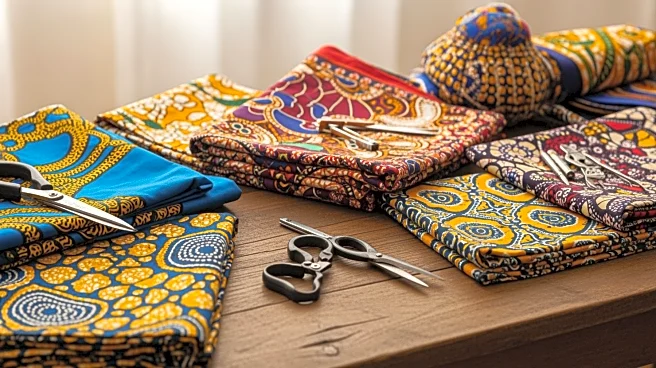What's Happening?
Designer Tia Adeola is relocating her brand's supply chain to Nigeria, focusing on local artisans and Nigerian craft for her Fall/Winter 2025 collection. This move is part of a broader trend where brands
are investing in West Africa's fashion infrastructure, aiming to leverage the region's rich textile heritage. Adeola's collection will feature traditional techniques such as cowrie shell beadwork and screen-printed Ankara on satin. International brands are also taking notice, with collaborations like Anya Hindmarch's hand-dyed dresses and Karl Lagerfeld's tote bags made from fabrics handwoven in Burkina Faso.
Why It's Important?
The shift towards West Africa as a fashion manufacturing hub is significant for the global fashion industry. It presents an opportunity to diversify sourcing markets and reduce reliance on traditional manufacturing regions. This development could lead to increased economic growth and job creation in West Africa, empowering local artisans and preserving traditional crafts. For international brands, it offers a chance to incorporate unique cultural elements into their products, enhancing their appeal and sustainability credentials. The move also aligns with growing consumer demand for ethically produced fashion.
What's Next?
As more brands explore manufacturing opportunities in West Africa, the region's infrastructure is expected to develop further, potentially becoming a key player in the global fashion supply chain. Continued investment in local talent and technology will be crucial to overcoming current challenges, such as limited infrastructure. Brands may increase collaborations with local artisans, fostering innovation and sustainable practices. The success of these initiatives could inspire other regions to adopt similar models, promoting a more diverse and inclusive fashion industry.
Beyond the Headlines
The emergence of West Africa as a fashion hub raises important ethical and cultural considerations. It highlights the need for responsible investment that respects local traditions and supports community development. Brands must navigate the complexities of integrating modern technology with traditional crafts, ensuring that local artisans benefit from these collaborations. This shift also underscores the importance of transparency in supply chains, as consumers increasingly demand accountability in fashion production.









